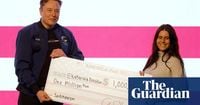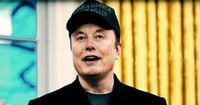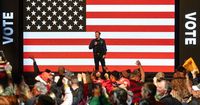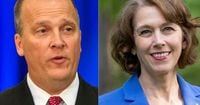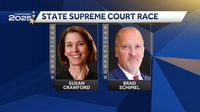The Wisconsin Supreme Court race is heating up as election day approaches, with Elon Musk taking center stage in a contest that has drawn national attention. The battle pits conservative candidate Brad Schimel against liberal contender Susan Crawford, and the stakes are higher than ever.
As of March 30, 2025, the race has surpassed $90 million in donations, making it one of the most expensive judicial elections in U.S. history. Musk, who has personally contributed $20 million to Schimel's campaign, held a rally in Green Bay that attracted around 2,000 supporters. Despite his significant financial backing, Schimel did not attend the event, which showcased Musk as the star of the show.
"I don’t think anyone could have predicted that this race could have focused so much on Donald Trump and so much on Elon Musk," said Anthony Chergosky, an associate professor of political science at the University of Wisconsin-La Crosse. Musk's involvement has turned the election into a referendum on his influence and the future direction of the Wisconsin Supreme Court.
The current court has a 4-3 liberal majority, and with one liberal justice retiring, the balance is at stake. The Wisconsin Supreme Court plays a crucial role in drawing congressional and legislative districts, as well as deciding key issues like abortion laws. Wisconsin is a battleground state that Trump won in 2024 by a mere 30,000 votes, making this election critical for both parties.
Musk's rally included a controversial $2 million giveaway, where he promised to reward Wisconsin voters who signed a petition against "activist judges." This decision has drawn criticism, with opponents arguing that it undermines the integrity of the electoral process. Musk's attorneys maintain that the giveaways are a form of free speech aimed at generating grassroots support against what they term "activist judges."
Critics of Musk's involvement have pointed out that his actions may be motivated by a pending lawsuit against the state of Wisconsin, which bans car manufacturers from owning dealerships. Currently, anyone purchasing a Tesla in Wisconsin must do so online and pick it up in either Illinois or Minnesota. Musk's lawsuit is likely to eventually reach the Wisconsin Supreme Court, raising questions about his intentions.
Meanwhile, early voting in Wisconsin is up 48% compared to previous elections, indicating heightened interest in this pivotal race. The intensity of the campaign has led to a heated environment, with Musk's supporters and opponents passionately advocating for their respective candidates.
On the campaign trail, Susan Crawford has been vocal about her opposition to Musk's influence. During an appearance with U.S. Senator Tammy Baldwin in Mequon, she referred to Musk as her opponent, asserting that his involvement is detrimental to the impartiality of the court. "I’m the only candidate in this race who has actually pledged to be fair and impartial. My opponent has said that he wants to be on the court to provide a supportive network for Donald Trump. That’s very partisan," Crawford stated.
Brad Schimel, on the other hand, has embraced Musk's support, arguing that his campaign is focused on the law rather than political affiliations. He emphasized that losing this election could have long-lasting consequences for Wisconsin, claiming, "If we don't win this on Tuesday, our next chance isn't until 2028. The leftists on the court will have five years to kick our teeth in and we will not recognize our state when we get to the end of the five years."
The election is set for April 1, 2025, with polls opening at 7 a.m. and closing at 8 p.m. The outcome of this race will not only determine the ideological balance of the Wisconsin Supreme Court but could also have significant implications for congressional redistricting and key social issues in the state.
As the candidates make their final pitches to voters, the influence of high-profile endorsements like Musk's and the financial resources backing them will undoubtedly shape the narrative leading up to election day. With both sides ramping up their efforts, Wisconsin voters are poised to make a critical decision that could reverberate through the political landscape for years to come.
In a state where every vote counts, the Wisconsin Supreme Court race is not just about judicial philosophy; it is about the future direction of the state and its impact on national politics. As the clock ticks down to election day, the stakes couldn't be higher.
